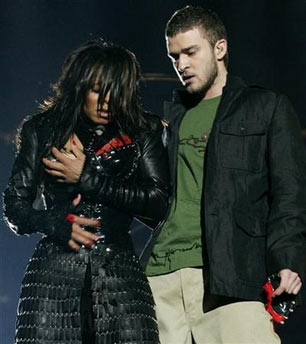
Janet Jackson (L) reacts after fellow singer
Justin Timberlake ripped off one of her chest plates, revealing one
breast, at the end of their half time performance at Super Bowl XXXVIII in
Houston, February 1, 2004. The US Federal Communications Commission
upheld on Wednesday its decision to fine 20 CBS Corp. television stations
a total of $550,000 for airing pop singer Janet Jackson's breast flash in
2004. [Reuters] |
The US Federal Communications Commission on Wednesday unanimously rejected
CBS' request to rescind its proposal to fine the network US$550,000 for Janet
Jackson's "wardrobe malfunction" during the 2004 Super Bowl halftime show.
In its order turning back CBS' appeal, the FCC said it had correctly applied
the nation's indecency standards to the broadcast in which Jackson's breast was
accidentally bared when singer Justin Timberlake pulled off part of her bustier
during the program.
"We reject CBS' contention that the commission misapplied the test for
broadcast indecency in the (original order)," the FCC wrote. "In doing so, we
note that CBS does not contest the commission's determination that the material
at issue here falls within the subject matter scope of our indecency definition
because it 'describe(d) or depict(ed) sexual or excretory organs or activities.'
Rather, CBS takes issue with our conclusion that the Super Bowl halftime show
was patently offensive as measured by contemporary community standards for the
broadcast medium."
On September 22, 2004, the FCC proposed the then-maximum fining of all 20 of
CBS' owned-and-operated stations the then-maximum US$27,500 for the incident
broadcasts.
As defined by the FCC, material is indecent if it "in context, depicts or
describes sexual or excretory activities or organs in a patently offensive
manner as measured by contemporary community standards for the broadcast
medium."
While obscene speech is not protected by the First Amendment, indecent speech
is. The federal courts and the FCC have ruled that such speech can be safely
aired from 10 p.m.-6 a.m.
While the indecency regulations have been upheld by a number of appellate
courts, the original precedent was set by the US Supreme Court in 1978 in the
Pacifica Foundation v. FCC case that centered around a broadcast of George
Carlin's "Filthy Words" comedy routine.
In its appeal, the network said the proposed fine -- technically a notice of
apparent liability -- defied logic because the commission lacked any evidence
that the network, or its parent at the time Viacom Inc., knew about the action
in advance.
Rejecting CBS' attempt to get the commission to reconsider its decision, the
commission sets up what could become another battle over the nation's indecency
laws.
CBS and the other networks already have appealed March 15 decisions that
netted proposed fines that totaled $3.6 million for "the broadcast of fleeting,
isolated and -- in some cases -- unintentional words."
Executives at the network said it was too early to say whether or not they
would take the Super Bowl case to court. The network said it still disagreed
with the FCC.
"CBS has apologized to the American people many times for the inappropriate
and unexpected halftime incident during the 2004 Super Bowl, and we have taken
steps to make certain it will never happen again," the network said. "But we
continue to disagree with the FCC's finding that the broadcast was legally
indecent. We will continue to pursue all remedies necessary to affirm our legal
rights, and so today's decision by the FCC is just another step in that
process."
While the commission vote was 5-0, one commissioner said the panel has failed
to give broadcasters the guidance they need to make decisions about what would
violate the indecency laws.
"While I agree with the ultimate outcome of today's Order on Reconsideration,
I concur in part because the commission again has not provided much-needed
clarity and guidance to our decision-making process in indecency enforcement,"
said Jonathan Adelstein, a Democratic appointee.
While Adelstein wants the commission to exercise more clarity, he also
thought the commission should fine only the CBS-owned stations and not all the
independently-owned affiliates that carried the program.
"I continue to believe the commission has decided erroneously to fine only
CBS owned-and-operated stations, not all stations that broadcast the indecent
material," he wrote. "Notwithstanding the fact that this commission has always
purported to apply a national indecency standard on the broadcast medium, the
commission has failed to penalize the vast majority of stations that actually
broadcast the offending halftime performance."
The FCC action comes as Congress is on the verge of approving legislation
that would raise the current maximum fine for broadcasting indecent content from
$32,500 per incident to $325,000 per incident. A bill doing that has cleared the
Senate and the House is expected to approve it and send it to President Bush for
his signature.